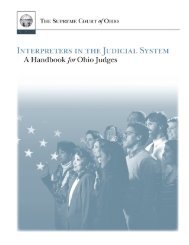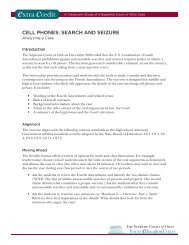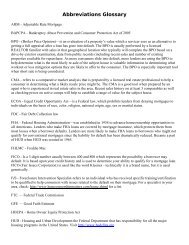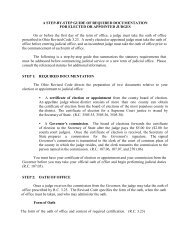Planning for Parenting Time: Ohio's Guide for Parents Living Apart
Planning for Parenting Time: Ohio's Guide for Parents Living Apart
Planning for Parenting Time: Ohio's Guide for Parents Living Apart
Create successful ePaper yourself
Turn your PDF publications into a flip-book with our unique Google optimized e-Paper software.
Long-Distance <strong>Parenting</strong> and Relocation<br />
LONG–DISTANCE PARENTING & RELOCATION<br />
<strong>Parents</strong> must be aware of the impact relocation will have on their child<br />
and that relocation may require the permission of the court.<br />
If the parents cannot agree on long-distance parenting time and<br />
relocation, the court will decide. Un<strong>for</strong>tunately, a decision by a judge<br />
may not please either party. Each relocation case is unique, and the right<br />
decision is based on the facts <strong>for</strong> each family. <strong>Parents</strong> should make a<br />
serious ef<strong>for</strong>t to resolve a parenting time dispute themselves or with the<br />
help of a mediator or an attorney. A reasonable agreement between the<br />
parents negotiated in good faith and proposed to the court by both<br />
parents usually is better than having a judge decide the matter after the<br />
expense and stress of a court hearing.<br />
Long-distance<br />
parenting means<br />
sacrifice – in time<br />
and money. It<br />
requires a strong<br />
commitment by<br />
each parent to<br />
ensure<br />
involvement by<br />
both parents with<br />
their child.<br />
A parent who wants to move a long distance, with or without a child,<br />
should think about many things be<strong>for</strong>e making a decision. Long<br />
distances often weaken the relationships between children and parents. If<br />
the move is necessary, parents might want to consider relocating both<br />
households to the same city. If it is not possible, parenting time <strong>for</strong> the<br />
distant parent must be at regular and frequent times during the year. The<br />
court considers many factors and parents should think about these<br />
factors. Each parent should take a moment to “stand in the other parent’s<br />
and the child’s shoes.” What are their points of view? How would I feel<br />
if my child moved away to another city? Think about the facts, including<br />
the age and maturity of the child, the child’s developmental needs,<br />
sibling bonds, school and work schedules, transportation costs, the<br />
presence of supportive family and friends in each city, and the gains or<br />
loss of extended family.<br />
For most children, a long-distance move may result in less regular<br />
contact with both parents. If both parents are within a reasonable distance<br />
of each other, the child benefits. When parents live far apart0 a child’s<br />
daily and weekly contact is reduced and large gaps of time without<br />
physical contact between the child and parent develop. When both<br />
parents move to the same general area, it is less disruptive. Regardless of<br />
the distance, a child will benefit from as much regular and frequent<br />
physical contact with each parent as possible.<br />
57
















